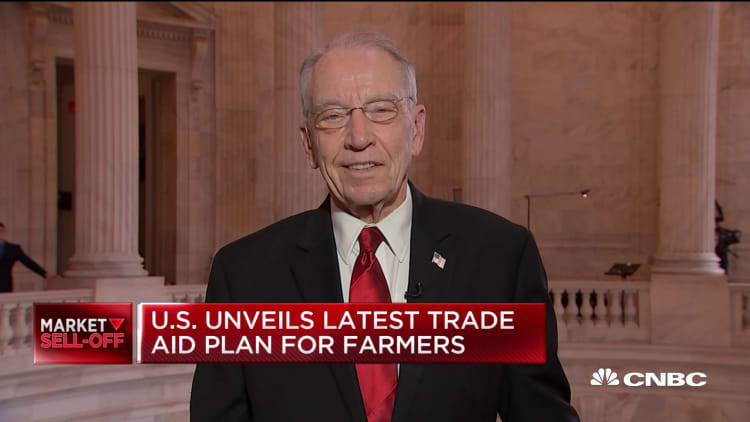
Farmers hurt by the ongoing U.S.-China trade war would rather have their markets back than the latest bailout from the Trump administration, Sen. Chuck Grassley, R-Iowa, told CNBC on Thursday.
The U.S. Department of Agriculture announced the $16 billion aid program earlier in the day.
"Farmers don't want aid. They want trade. They want markets," Grassley said on "Closing Bell."
"You work for decades to build up markets. You've got to be a credible supplier of your goods and these negotiations have interfered."
However, Grassley, who is a member of the Agriculture Committee and also has a family farm, said that his constituents know that China has been "cheating for three decades."
"They ought to live by the rules of international trade and … farmers know that you've got to get China to quit stealing our intellectual property," he added.
The centerpiece of the farmer aid package is cash payments totaling $14.5 billion to producers of a variety of crops as well as dairy and pork producers impacted by retaliatory tariffs. U.S. tariff revenue collected by the Treasury would be used to support the program, according to the USDA.
Grassley said he hopes only $5 billion will ultimately be used because negotiations will get back on track.
"I can't predict that. All I know is our side is willing at the drop of a hat to go to Beijing to do more investigating," he said. "But China is going to have to go back to where they were on the 10-yard line of getting the ball over the goal."
Earlier this month, the U.S. said China reneged on past promises and Washington increased tariffs on $200 billion in Chinese goods to 25%. China retaliated by raising duties on $60 billion in American products.
Overall, soybean farmers have been among the hardest hit in the skirmish in terms of dollar value. Before the trade war, China bought roughly half of U.S. soybean exports. But the value of soybean exports to China fell 74% to $3.1 billion in 2018 from about $12.2 billion the previous year, according to the USDA.
Not everyone is applauding the latest aid package.
Sen. Debbie Stabenow, D-Mich., and a ranking member of the Agriculture Committee, said farmers are struggling as the administration "continues to pursue a chaotic trade agenda."
"Unfortunately, this complex scheme leaves them with more questions than answers. I have a number of concerns about whether this plan is fair and equitable to all farmers. Government checks are no replacement for lost markets, and this temporary support will only go so far," she said in an statement.
Producers of soybeans received the largest aid in last year's $12 billion bailout. The plan announced Thursday includes direct payments to farmers of more than two dozen agricultural commodities, including grains, oil seeds and specialty crops, as well as dairy and pork.
According to the USDA, the top five states where farmers received trade aid as part of last year's program were Illinois, Iowa, Kansas, Nebraska and Indiana. Trump won all but one of those states — Illinois — in the 2016 presidential election.
Despite being hard hit by the trade war, farmers in Iowa are still supporting President Donald Trump "as of now," Grassley said.
"Don't forget it's 15 months away from election season. And a lot of things can happen in 15 months but also a lot of good things can happen."
Iowa has about 87,000 farms and 129,000 farm operators, according to the Iowa Farm Bureau. The state is the nation's second-highest producer of soybeans, the organization said.



